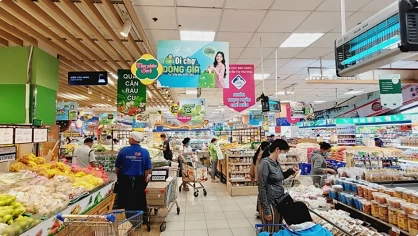
PM signed Directive to stimulate domestic consumption, production, market development
Latest
 |
| Illustrative image (Source: baotintuc.vn) |
The Directive emphasises the need to address challenges in production and business operations, boost consumer demand, and accelerate domestic market development to promote growth, maintain macroeconomic stability, control inflation, and ensure major economic balances. In the document, he called on ministers, heads of government agencies, provincial and municipal leaders, industry associations, and businesses to implement several key tasks and solutions.
Regarding general tasks, the Government calls for the prompt activation of investment projects aimed at creating new production capacities. This includes focusing on reviewing and prioritising measures to overcome challenges related to public investment disbursement, credit packages, land issues, and policies to attract social resources serving projects in line with market scale and signals.
It is also necessary to introduce policies to encourage consumption and investment in sectors where domestic production has strength and the domestic market has demands, while implementing those supporting domestic enterprises in joining the supply chains of support industry products by foreign-invested companies in Vietnam.
Ministries, agencies, and local authorities are tasked with deploying digital transformation technologies, including artificial intelligence (AI), big data, and blockchain, to further enhance administrative reforms and simplify procedures.
Additionally, efforts are set to be intensified to promote domestic trade, connect supply and demand, provide market information, and offer legal advice to small- and medium-sized enterprises.
In terms of specific responsibilities, the Ministry of Industry and Trade is assigned to strengthen the integration between production and distribution, improve links in the commodity value chain, and ensure compliance with quality and food safety regulations. It will further support local businesses in addressing trade defence investigations, origin fraud, and environmental technical barriers to boost exports to major markets like China, the EU, the US, Japan, and the Republic of Korea.
The Ministry of Finance is set to manage an expanded fiscal policy effectively, coordinate with monetary and macroeconomic policies to boost growth, stabilise the economy, control inflation, and ensure economic balances.
The State Bank of Vietnam’s tasks involve the implementation of a proactive, flexible, and effective monetary policy, in harmony with fiscal and other macroeconomic policies. Meanwhile, missions for the Ministry of Agriculture and Rural Development include directing localities to enhance production, consumption, and export of farm produce from concentrated farming areas.
The Prime Minister also assigns specific work to the Ministry of Construction, the Ministry of Planning and Investment, provincial and municipal authorities, industry associations, and major corporations.

























